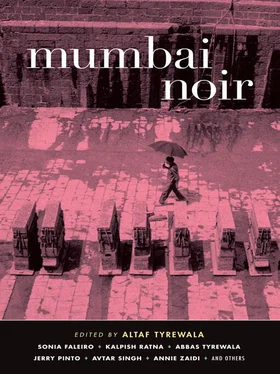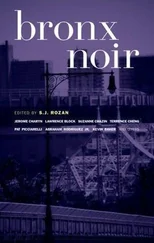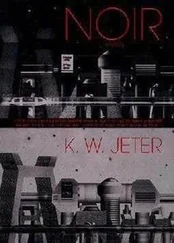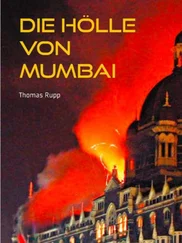Altaf Tyrewala - Mumbai Noir
Здесь есть возможность читать онлайн «Altaf Tyrewala - Mumbai Noir» весь текст электронной книги совершенно бесплатно (целиком полную версию без сокращений). В некоторых случаях можно слушать аудио, скачать через торрент в формате fb2 и присутствует краткое содержание. Год выпуска: 2012, Издательство: akashic books, Жанр: Крутой детектив, на английском языке. Описание произведения, (предисловие) а так же отзывы посетителей доступны на портале библиотеки ЛибКат.
- Название:Mumbai Noir
- Автор:
- Издательство:akashic books
- Жанр:
- Год:2012
- ISBN:нет данных
- Рейтинг книги:5 / 5. Голосов: 1
-
Избранное:Добавить в избранное
- Отзывы:
-
Ваша оценка:
- 100
- 1
- 2
- 3
- 4
- 5
Mumbai Noir: краткое содержание, описание и аннотация
Предлагаем к чтению аннотацию, описание, краткое содержание или предисловие (зависит от того, что написал сам автор книги «Mumbai Noir»). Если вы не нашли необходимую информацию о книге — напишите в комментариях, мы постараемся отыскать её.
Mumbai Noir — читать онлайн бесплатно полную книгу (весь текст) целиком
Ниже представлен текст книги, разбитый по страницам. Система сохранения места последней прочитанной страницы, позволяет с удобством читать онлайн бесплатно книгу «Mumbai Noir», без необходимости каждый раз заново искать на чём Вы остановились. Поставьте закладку, и сможете в любой момент перейти на страницу, на которой закончили чтение.
Интервал:
Закладка:
Justice Talukdar picked up his papers and hurried out of the courtroom; he felt it was important for a person in his position not to get emotionally involved with people he judged. As he got out of the building through a special exit, kept locked only for a day like this, he saw her sitting under a tree, crying violently, seemingly unaware of the son sitting beside her. She always wore the full naqaab in court, and this was the first time he saw her face. She was beautiful and much younger than he had imagined, and the tragedy and youth only highlighted her vulnerability, accentuating her beauty. He felt a strong desire to comfort her but checked himself, knowing that both of them would not know what to say to each other. He had for long nights agonized over the impact of his sentence; does one human have the right to send a fellow human to death? Does the fact that society and law granted him that right make it any different from murder where the person assumed that right for himself; was that in fact the only difference? How was tightening a noose around the neck and allowing a person to hang to death less violent than stabbing or shooting at close range? All the agony came flooding back, and he felt less sure than he had in the morning when he arrived at the court. The law had been laid down and his duty was only to ensure that justice was delivered impartially, once the crime had been proven without doubt. There was simply no element of doubt in this case, and it would have been a gross violation of law if he had not upheld the rightful judgment. What if the father, son, brother of every person who was killed in the blast were to grant themselves the right to park a scooter full of explosives in a public place?
His car stopped at a signal, and from the backseat he noticed a temple on the sidewalk. People stopped by, clanged the metal bell hanging on the entrance, and folded their hands in a brief prayer — a plea to be answered, a wish to be fulfilled. He had never believed in temples and prayers, only in his own sense of justice and fair play. There was a statue of Lord Krishna inside the temple with the flute on his lips; playful, serene, and extremely assured. On an impulse, Justice Talukdar folded his hands and bowed his head; less in a gesture of worship, more out of respect for someone who, even in the midst of a fierce battle, was so certain about what was right and what was wrong.
Salma cried violently at the unfairness of it all — how could one incident take away everything that was valuable to her.
She had not known Mumbai or Asghar until marriage; for a girl brought up in the sleepy hamlet of Gazipur in UP, men and Mumbai symbolized dominance and corruption. Yet, after her marriage, she was pleasantly surprised by the ease with which she was accepted, as if the city and Asghar had all along been waiting for her. Mumbai was like a playful elder sister, vibrant and all-encompassing, and Asghar was unlike the men in her village — he treated her with a respect and companionship that was almost like love. She felt she had known the man and his city all along and it was only natural that now she had come to stay with them.
Asghar had set up a small Haj and Umrah travel agency in the living room of their one-room house in the predominantly Muslim neighborhood of Mahim. Five times during the day the loudspeakers from the numerous mosques would blare the adhan, and the narrow streets would be filled with bearded, paan-chewing men answering the muezzin’s call to the faithful for prayers. On their way back, the men, most of whom ran small local businesses, would sit and chat with Asghar in his office, taking a pamphlet as they left. Asghar had no need to sell his religious tours; the muezzin and the preachers had already done that job for him.
As the businesses prospered and the preachers in the mosque became more effective, Asghar’s business started to pick up. With the savings from their first big season, Asghar bought a secondhand scooter. He had always wanted to purchase a motorcycle but Salma was adamant about the rugged, bulky two-wheeler — a motorcycle was after all not a family vehicle. Almost on cue she became pregnant with their first child, as if all along it had been waiting for its future carrier to be purchased.
The demolition of the Babri Masjid was the first sign that the game was beginning to change. The usually cacophonic streets suddenly fell silent as if in mourning, and the loud call of the muezzin sounded eerie in the deserted lanes. The few people who ventured out to the mosque would hurry back home and the talk, if any, was full of vengeance and bitterness. Salma sensed a certain anxiety, a foreboding mixture of fear and anger, and the news of communal riots in the neighboring town of Bhiwandi only added to the unease.
They were having dinner in their house one night when there was a frantic knocking and Salma knew instinctively that something was drastically wrong — as if all that unease and disquiet of the last few days had finally reached her doorstep and erupted into those loud, hysterical thuds.
“Run!” was the only word their neighbor uttered, and the sheer look of terror on his face was enough for Asghar to drop his meal unfinished and rush out of the house. Once outside they did not know where to go; the familiar streets wore a deserted, closed look, as if wanting to shut themselves from the gory spectacle that was about to be played.
They scrambled up to the terrace and from there Salma saw a face of the city she never knew existed. The night was lit by huge bonfires and the calm would suddenly be pierced by gunshots and shrieks that reverberated long after the victims had fallen silent.
And then the mob appeared at the corner of the street, the fire from their torches reflecting from their gleaming, naked swords, disguising their identities but vividly displaying the determination and glee in their eyes. They set about torching everything in sight as if it had all been kept there to be burned.
Like the earth, destined to its seasons, the city eventually came back to its busy, careless way of life, but Salma knew that it was only a façade, for she had seen the face behind it and it could not be forgotten. The vibrancy and the companionship had died that night. Asghar lived with her but she was no longer sure what he felt or thought. He nursed her dutifully during the pregnancy and when the child was born blind he did not let his distress affect her, but this new lack of sharing pained her more than all the other tragedies. And when the police came to pick him up for the explosion in the marketplace she was numb, not from shock but from the pain of knowing that she had lost him forever.
The verdict had only formalized this. She never doubted Asghar’s complicity in the crime or the validity of the judgment, but Asghar was not a criminal, not the heartless coldblooded murderer the judge had made him sound. And she cried with the thought that the world and the aggrieved relatives of the victims of that blast would never know about it. It was a burden she and her son would have to carry to their graves.
The sheer unfairness of it all made her feel helpless. The verdict had delivered justice but it was in some way not fair to the three of them and to the ones affected by the blast. Because those present in the courtroom that day were not the ones who had perpetrated both the crimes; they were all in fact the victims.
Time, impartial and fair, is nature’s ultimate panacea, the relief for all pain. Yet, when the court announced the death penalty for the man who had been responsible for her husband’s death six years ago, Sneha felt the old pain suddenly surging back; the phone call from the police asking her to come to the hospital at once, the mangled body of her husband, the crowd at the funeral, and the sudden empty nights. It was as if after traveling a long distance to get away from something, she had realized that what she wanted to get away from was not in that place but inside her own self. And she cried with the realization that what she had lost would never be recovered by all the justice the world could deliver; that she was wrong to have thought that today with the verdict all her ghosts would be laid to rest.
Читать дальшеИнтервал:
Закладка:
Похожие книги на «Mumbai Noir»
Представляем Вашему вниманию похожие книги на «Mumbai Noir» списком для выбора. Мы отобрали схожую по названию и смыслу литературу в надежде предоставить читателям больше вариантов отыскать новые, интересные, ещё непрочитанные произведения.
Обсуждение, отзывы о книге «Mumbai Noir» и просто собственные мнения читателей. Оставьте ваши комментарии, напишите, что Вы думаете о произведении, его смысле или главных героях. Укажите что конкретно понравилось, а что нет, и почему Вы так считаете.











